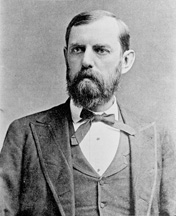Richard F. Pettigrew
| Richard Franklin Pettigrew | |
|---|---|
 |
|
|
United States Senator from South Dakota |
|
|
In office November 2, 1889 – March 4, 1901 |
|
| Preceded by | (none) |
| Succeeded by | Robert J. Gamble |
| Member of the U.S. House of Representatives from Dakota Territory's at-large district |
|
|
In office March 4, 1881 – March 3, 1883 Delegate |
|
| Preceded by | Granville G. Bennett |
| Succeeded by | John B. Raymond |
| Personal details | |
| Born |
July 23, 1848 Ludlow, Vermont |
| Died | October 5, 1926 (aged 78) Sioux Falls, South Dakota |
| Political party | Republican |
Richard Franklin Pettigrew (July 23, 1848 – October 5, 1926) was an American lawyer, surveyor, and land developer. He represented the Dakota Territory in the U.S. Congress and, after the Dakotas were admitted as States, he was the first U.S. Senator from South Dakota.
Pettigrew was born in Ludlow, Windsor County, Vermont, and moved with his parents to Wisconsin in 1854. The family settled in Rock County, near Union, Wisconsin. He studied law in Iowa, and entered the law department of the University of Wisconsin–Madison in 1867. He moved to Dakota in 1869 to work with a United States deputy surveyor.
Pettigrew settled in Sioux Falls, where he practiced law and engaged in surveying and real estate. He was a member of the territorial House of Representatives and served on the Territorial council. He was elected as a Republican to the U.S. House, serving from March 4, 1881 - March 4, 1883. He was an unsuccessful candidate for reelection in 1882, but returned to the territorial council from 1885 to 1889.
When South Dakota was admitted as a state, Pettigrew was elected as South Dakota's first Senator to the United States Senate. He served from November 2, 1889 to March 4, 1901. He introduced a bill to fund the structure, recommending that native Sioux quartzite be used for construction of the state's first Federal building. He was re-elected in 1894, but left the Republican party on June 17, 1896 to join the Silver Republicans, a faction of the Republican Party which opposed the party's position in support of the monetary gold standard. He was an unsuccessful candidate for reelection in 1900. Pettigrew was a strong opponent of President William McKinley's attempt to annex the Republic of Hawaii against the wise of its many native residents. In a congressional speech, he stated:
...
Wikipedia
